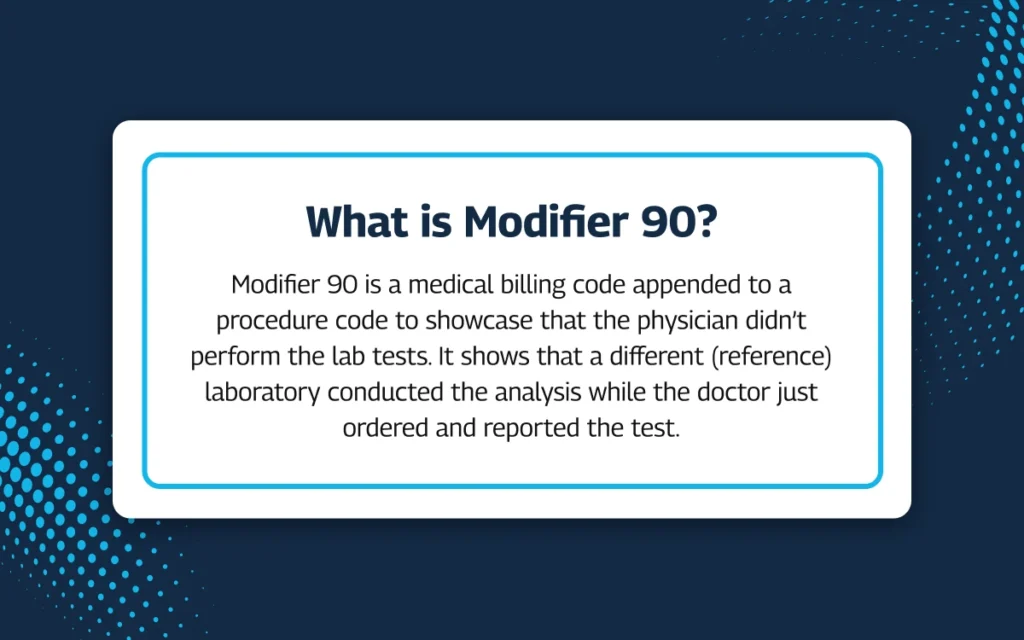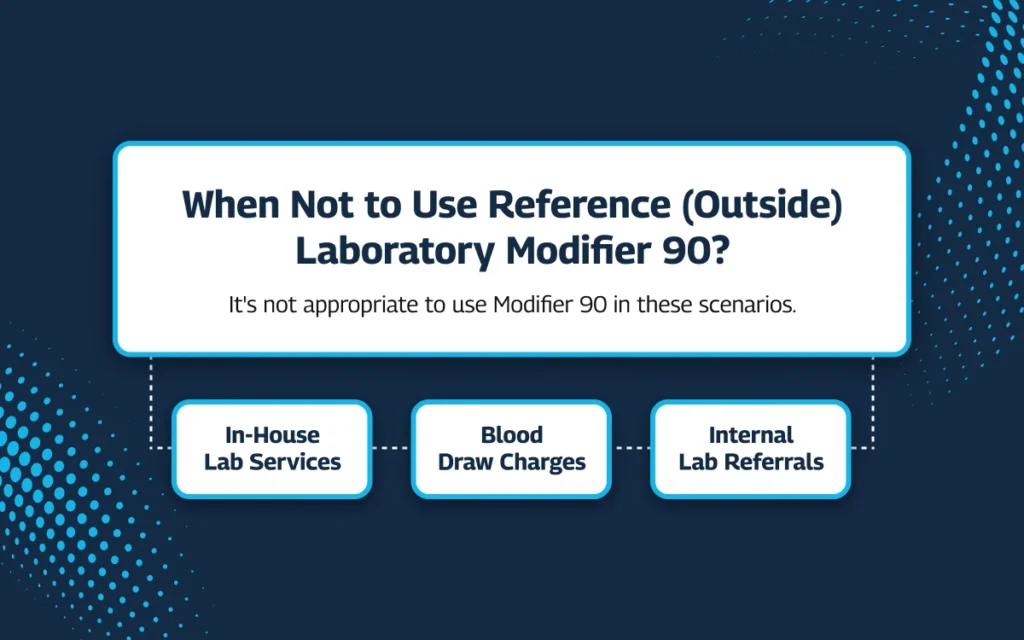Reference (Outside) Laboratory Modifier 90 identifies the laboratory procedure performed by a party other than the reporting or treating physician or healthcare provider. This guide will help you understand what the Modifier 90 reference lab is when it’s used and how it impacts your medical billing.
What is Reference (Outside) Laboratory Modifier 90?
When a healthcare provider uses an outside lab for testing (thus the name), they append modifier 90 to the specific lab test code on the bill to tell insurance companies that the actual testing was performed by some other part (reference lab in this case), and not the doctor’s office.
Reference (Outside) Laboratory in the name signifies the specialized lab to which a healthcare provider outsourced the test.
What is Modifier 90?
Modifier 90 is a medical billing code appended to a procedure code to showcase that the physician did not perform laboratory tests. It shows that a different laboratory conducted the analysis while the doctor ordered and reported the test.

For example, a physician orders a complete blood count (CBC) test for a patient after drawing the sample at the office and then sends it to a specialized lab for analysis due to the complexity of the test or the lack of necessary equipment in-house.
In this scenario, the physician would bill for the CBC test using the appropriate CPT® code and append modifier 90 to refer to the external lab test.
When to Use Reference (Outside) Laboratory Modifier 90?
Modifier 90, also known as “Reference (Outside) Laboratory,” plays an important role when an external lab performs a test. Understanding when it’s appropriate to use modifier 90 is essential for healthcare providers, labs, and patients.
Quick Guidelines for Correct Use of Modifier 90
- In most cases, the reference lab will bill the insurance company directly for the services a physician orders. Modifier 90 on the claim clarifies this.
- Append Modifier 90 for the final lab performance of the test if a (referring) lab might refer a specimen to another further specialized (reference) lab.
- Attach Modifier 90 to the specific test code performed by the reference laboratory.
- When billing for tests done by a reference lab, submit separate claims, one with Modifier 90 and another without it.
- Accurately show the reference lab’s charges for the test on the claim.
- Modifier 90 claims often involve two different Clinical Lab Improvement Amendment (CLIA) numbers, one for each party (both labs or provider and the lab) involved.
- The billing information should reflect the healthcare provider who ordered the test, not the reference lab.
Understanding these Reference (Outside) Laboratory guidelines helps healthcare providers (or referring labs in some cases) ensure accurate billing for tests performed by outside labs (or reference labs in some cases).
When Not to Use Reference (Outside) Laboratory Modifier 90?
Using Modifier 90 correctly ensures accurate billing for reference labs. But there are situations where you should avoid it.

It’s not appropriate to use Modifier 90 in these scenarios.
1 In-House Lab Services
Modifier 90 is only for outside labs. If the doctor’s office or clinic performs the test itself, even with specialized equipment, you don’t need it. This applies to standard lab tests and anatomic pathology services like tissue biopsies or cytology (cell examination).
2 Blood Draw Charges (CPT Code 36415)
Drawing blood (venipuncture) by a lab or physician cannot be billed as a reference lab service. Modifier 90 doesn’t apply to CPT code 36415, which covers blood drawing. The drawing fee remains with the initial provider even if the blood is sent to another lab for testing.
3 Referrals Within the Same Lab
Reference (Outside) Laboratory Modifier 90 is meant for situations involving entirely different labs. If a clinic or hospital has multiple labs within its system, and one lab refers a specimen to another for further analysis, you don’t use Modifier 90. Internal lab referrals don’t require separate billing with Modifier 90.
Note: Modifier 90 doesn’t bypass other medical billing regulations; standard edits for incorrect coding or bundling might still apply. If you’re still unsure whether a specific test qualifies for Modifier 90, contact us for a free consultation right now.
Streamline Reference Laboratory Billing
Understanding Modifier 90 and its proper application can improve the accuracy of your reference laboratory billing. However, navigating medical coding and billing regulations can be time-consuming and require ongoing efforts.
That’s where we at Lab Billing Services become your lab-specific revenue and billing partner. Our certified lab coders possess in-depth knowledge of reference laboratory billing practices, including Modifier 90 usage.
